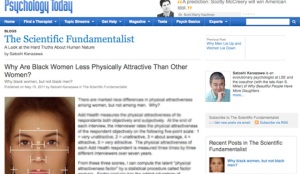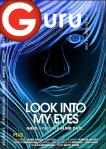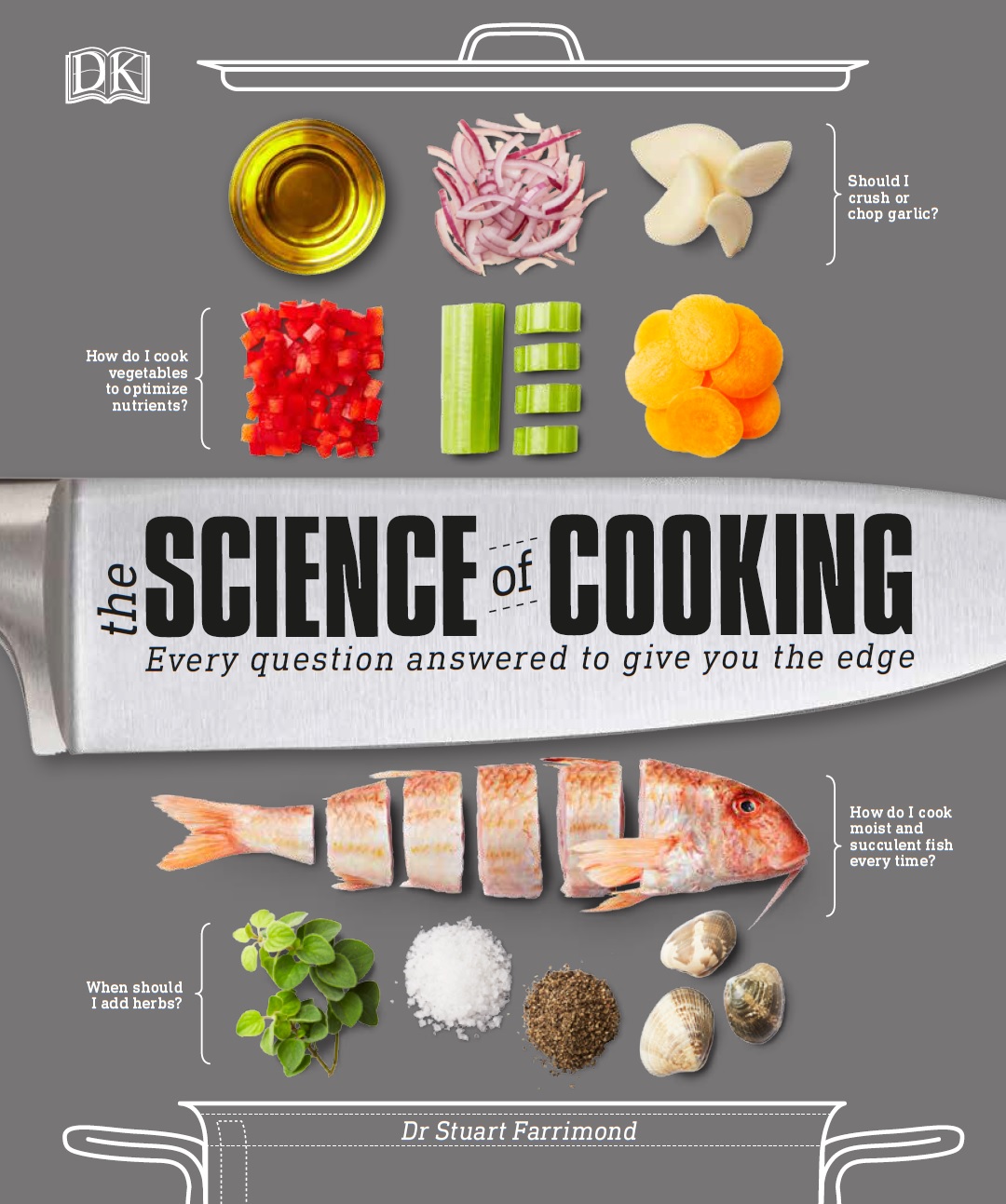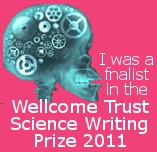A note to lawyers – today’s blog post in no way endorses fascism, racism or any other perverse ideologies. It is intended to stimulate debate and thought.
Phew, I think I’m safe from a libel suit.Last week Dr Satoshi Kanazawa, lecturer and psychology guru, was suspended from most of his teaching duties at the London School of Economics. After writing a blog article entitled “Why are black women less physically attractive than other women?”, a furore erupted.
The far-right English Defence League lapped it up, citing it as evidence for their cause. Everyone else said it was utter tosh. Dr Kanazawa, being no stranger to controversy, has a publication list that would enrage women, ethnic minorities, the poor, Jewish, and… well, pretty much everybody who isn’t rich and middle class.
But this all raises a far more pressing question: Should scientific research, like Kanazawa’s, ever be censored? Are there ever any ‘no-go’ areas in the quest for greater knowledge and understanding?
Dr Kanazawa’s flawed research
I haven’t explored every nuance of Dr Kanazawa’s research – but it’s fair to say many academics, even if they don’t mind his controversial topics, think his methods suck. Here’s a summary of some of his more headline-grabbing papers:
- “Battered Woman Have More Sons: A Possible Evolutionary Reason Why Some Battered Women Stay.”
- “Why Liberals and Atheists Are More Intelligent.”
- ““First, Kill All the Economists….”: The Insufficiency of Microeconomics and the Need for Evolutionary Psychology in the Study of Management.
- “Why Beautiful People Are More Intelligent.”
- “Intelligence and Homosexuality.” (forthcoming)
Which is fine, if we assume the PVVT is a good measure of ‘general intelligence’ (that’s a big ‘if’). If we also discount the numerous factors that could bias his results (such as socio-economic factors, schooling and cultural differences) then – who knows? He might just be onto something.
Science faces an Ethical Dilemma
From what I’ve explored so far, I’m not a fan of Kanazawa’s work. Yet his research methods have broken no ethical code – interviews and ‘IQ tests’ aren’t wrong. He’s not acting like a Nazi scientist of Second World War infamy.
If his divisive blog piece was a simple explanation of current research – something all science writers do – then I’d be inclined to have sympathy for him. You can’t find his article anywhere on the internet any more (just a brief apology by Psychology Today) so it’s impossible to comment on what he actually wrote.However, It seems there is a greater dilemma: Should the journals have published his work in the first place? If they felt his techniques were acceptable – then fine – but shouldn’t scientific institutions consider the potential ramifications of the conclusions drawn? (no matter how tenuous)
I would hate to live in a world where scientific endeavours are wholesale censored. When pharmaceutical companies refuse to publish results that show their medications don’t work well, I get enraged (like Ben Goldacre’s - watch his fabulous rant here). The idealistic part of all scientists is for science to advance with minimum hindrance.
But what if such research leads to great harm? Atomic Weapons anyone?
Let us suppose that it could be comprehensively concluded that a racial group had a genetic superiority over others. Would we want to know the results? When would it be fair to publish these findings?
There’s no obvious answer, but surely the ‘greater good’ must come into the equation. I suggest that ethical committees, journals and research institutions not merely consider the ethics of the methods, but the implications of the potential findings. A degree of common sense should prevail.
Especially when the logic is anything like Kanazawa’s…
.
Thanks for reading - feel free to comment below…
REFERENCES:
Kanazawa, S. (2010). Why Liberals and Atheists Are More Intelligent Social Psychology Quarterly DOI: 10.1177/0190272510361602
WANT SOMETHING DIFFERENT? I’ve been fortunate enough to part of a team that has started a bi-monthly digital magazine. Designed to deliver engaging, relevant articles, it’s also about giving new or undiscovered writers a chance to write to a growing audience of readers. Why not check it out here!It’s also free… (bargain)














The studies I’ve read of his have over-interpreted the available data, and I’ve seen him criticised over statistical methodology. But that’s pretty much par for the course - I could say the same for most papers I read! I suspect the real problem is that he chooses to overinterpret data and then write about it in a popular medium in a way that seems like it is setting out to slay sacred cows. But if you are going to attack the vulnerable and disadvantaged, then you need first to be on rock-solid ground, scientifically speaking. Which he isn’t.
Posted by Tom Rees (@Epiphenom_blog) | November 1, 2011, 10:59 pmMost serious universities have ethics committees reviewing research proposals submitted to funding organisations. One of their concerns is the implication of research. Most serious academic journals have editorial boards and peer-reviewed articles. It is diffiult to ask for more…
Posted by Dr. François-Pierre Gingras, University of Ottawa (Canada) | November 2, 2011, 12:25 amThanks for your comments Tom and Dr Gingras,
Tom - I think you’ve hit on a top point. There’s a lot of shoddy methodology out there - and there’s plenty of bloggers who do a good job at trying to bring it to light. A while back I got quite involved with a particularly contentious piece of research on acupuncture - demonstrating nothing more than a placebo effect, but heralded in the editorial as evidence of acupuncture efficacy.
Kanazawa seems to be promoting a the (so called) Savanna-IQ hyptohesis (perhaps he’s the only one?). His papers seem to have Daily Mail - style headlines, but when you explore the actual numbers the evidence is lacking.
Dr Gringras - thanks for pointing that out, I hadn’t realised that committees considered the implications of their research. I’ve never put in a research proposal myself.
There’s some irony that the London School of Economics are now suspending him for writing about research that must have passed their own ethics committee!?
Posted by Stuart Farrimond | November 2, 2011, 9:50 amGood examples for the question above:
If people read the paper about acupuncture, and use it, they get a boost of the belief their bodies can self-heal.
(which it can, in high probability). Just papers which claim to heal something above those abilities (HIV!) should not be printed.
If people read sexist, racist and violence-endorsing stuff in a respected science paper, they will only in small degree BECOME more sexist..etc. themselves, BUT if they are in a position to make political decisions, they will less likely see it as a problem and less likely vote for a program to tackle it.
AND THAT HAS BAD EFFECTS ON US ALL.
Posted by Runa | November 2, 2011, 11:46 amInteresting points 🙂
So scientific institutions and journals have a responsibility to the politicians and policy makers who might read them and be influenced by them?
Posted by Stuart Farrimond | November 2, 2011, 8:45 pmYou can find a copy of Kanazawa’s article here: http://www.quora.com/What-makes-Why-Are-Black-Women-Less-Physically-Attractive-Than-Other-Women-unscientific - I read it at the time and I think it’s an accurate reproduction.
Dr. Kanazawa is just a bad scientist: it’s a pity that his shoddy research has been so widely circulated and become part of the face of Evolutionary Psychology.
Posted by Jack Aidley | November 2, 2011, 9:58 amHi Jack,
Thanks for the link - very interesting stuff.
And yes, couldn’t agree with your sentiments more 🙂
Stu
Posted by Stuart Farrimond | November 2, 2011, 10:16 amFree speech is free speech and it can be nasty. Norm Chomsky defended the right of holocaust deniers even when he had relatives killed. The worse thing to do is hide these ideas. This blog for example, discussed this guys work so us who are science “groupies” or work in a different field have an understanding of what is going on. That would not have happened if it had been censored. If it had not been for Dr. Stu and PZ Myers, I would still hold hope for accupuncture, I look with a more critical eye today.
The problem as most of us lefty critical thinker comment is the lack of science education, especially by the popular media. On one hand they need to sell publications to stay in business, however many seem to have sacrificed critical judgement. While it was not very many contacts and it happen early in the last migration out of Africa, the headline “humans mated with neanderthals” is much more attention getting than a very small part of our DNA is from a sister branch of hominds.
I do hope the academic journals will not hide out when controversy happens, but educate.
Posted by Patrick Wm Connally | November 2, 2011, 6:48 pmHi Patrick,
Thanks for chipping in - you make some great points.
As I hoped to convey in what I wrote, I’m not an advocate of censorship - heaven forbid we no live in a land where what we see and read is censored.
That said, I’m not naive - all developed countries exercise at least some degree of internet censorship: Check out these incredibly enlightening pieces (from the very left wing magazine GOOD):
http://www.good.is/post/internet-censorship/ (short article and video)
http://www.good.is/post/infographic-think-america-s-internet-isn-t-censored-think-again/ (infographic)
Education: Yes yes and again yes! I long for the day when critical thinking is taught at schools and as readily as arithmetic and trigonometry.
For a long time, I’ve been frustrated by the tabloid-style of science reporting that most people read (and even the much-respected BBC is guilty of this).
Why can’t the media present science in an engaging yet unbiased manner? I believe it is possible.
It’s one of the main reasons I started the Guru project (at gurumagazine.org) - an attempt to make science just as interesting as the popular media - but without compromising on the facts. If you forgive the shameless plug (it’s something I’m deeply passionate about) we’ve been running about six months and a lot of interest has been generated, but on the most part (due to lack of money for a marketing campaign) it has yet to reach the masses (25,000 doesn’t quite cut it). No-one has yet committed to financially support the project - which is what is dearly needed for this vision to truly accomplish its aims. I still ponder whether some like minded organisation could help - I’m sure there’s a like minded ‘lefty’ out there(!)
Whether our Guru idea does it, or someone else does, or (better) there is a change in mentality in the media - there needs to be some serious redressing of how science is reported to the general public.
Stu
Posted by Stuart Farrimond | November 2, 2011, 9:11 pmMr. Farrimond,
Did you read a single one of the many critiques of his terrible research methods published this May before writing this “controversial” post? The reason Kanazawa should lose his job at LSE is that he is a failure at science - whether social, biological or statistical. Time and time again he wastes readers’ time with half-baked “controversies” (like the one I would argue you have manufactured here), and does not validate his arguments with valid scientific evidence. He, in fact, skews data to meet his ends. Please see my guest blog post in Scientific American for more (along with SB Kaufman and Jelte Wicherts’ piece in Psychology Today, also cited below). I respectfully ask that you consider applying the same principles to your written legal/ethical analysis that we rightfully expect scientists to apply to their research. Otherwise, your blog is simply spreading Kanazawa’s affliction - a malady I consider fatal to rational discourse.
Sincerely,
Khadijah M. Britton
Author: http://blogs.scientificamerican.com/guest-blog/2011/05/23/the-data-are-in-regarding-satoshi-kanazawa/
Also advise you read: http://www.psychologytoday.com/blog/beautiful-minds/201105/black-women-are-not-rated-less-attractive-our-independent-analysis-the-a
Posted by Khadijah M. Britton (@KMBTweets) | November 3, 2011, 6:52 amHi Khadijah,
Thanks for commenting! I shall attempt to address your points and clarify matters.
I, like you, do not agree with Kanazawa’s flawed methods or work (hopefully, the tongue-in-cheek lawyer comment explained that from the off). Also, the statement ‘he might just be onto something’ was, of course, satirical.
This post was not an attempt to explore his methodologies in any depth. As your citations demonstrate – this has already been done at length. Moreover, this post is in no way endorsing such terrible (and offensive) research – and I am concerned that you read this post in that way. In addition, nowhere did I state this post was ‘controversial’ (although perhaps I should have!)
The purpose of the post was to simply pose the topical question to a general reader:
- Are ever any ‘no-go’ areas for science?
Personally, the question of whether research that broaches sensitive subjects should ever see the light of day is a pertinent one – both to the general public and the scientific community. Many might feel that certain topics should never be investigated by researchers. Others, like yourself, are of the opinion that this kind of research should only be published if there is ‘extraordinary evidence’ to prove such ‘extraordinary claims’. I would agree.
However, the post was intended to stimulate thought amongst people, perhaps not familiar with the issues, to come to their own conclusion (hopefully a similar one to yours).
Please do not misunderstand – I am not ‘employing Kanazawa’s tactics’ – I have no agenda to encourage racial or cultural division, and in no way endorse his research methods.
Dr Stu Farrimond
Posted by Stuart Farrimond | November 3, 2011, 10:00 amI think Tom’s got it: The problem is not really that Dr. Kanazawa’s work is mediocre (mediocrity is, by definition, pretty common!), nor is the problem that his work is controversial and has conclusions that if true would be very politically and socially uncomfortable — I am of the mindset that the genie will come out of the bottle some way or other, so attempting to conceal an established scientific fact is folly.
The problem is that Kanazawa is both mediocre and controversial. The money quote from Tom is: “[I]f you are going to attack the vulnerable and disadvantaged, then you need first to be on rock-solid ground, scientifically speaking.” Well said. It’s one thing to publish a scientifically weak paper on the mating habits of Australian snails, but this kind of stuff, you better be damn sure your data ducks are all in a row. And Kanazawa doesn’t. He routinely goes off half-cocked, with speculative Just So stories based on weak data — and deliberately seeks out provocative conclusions. That’s eye-roll inducing at best, and downright mean-spirited at worst (when he is making potentially dangerous statements about battered women, for example).
Worse, Kanazawa helps give evolutionary psychology a bad name. It is a plain fact that a lot of our behaviors have evolutionary origins (although which ones, and to what extent, is not well understood at present) and I suspect that as we start to discover more of this, some of the conclusions will be politically unpalatable. EP (and its predecessor, sociobiology) have received plenty enough undue criticism from folks who did not like how its implications interacted with their political philosophy; the last thing this field needs is well-deserved criticism of the same kind. Nuts to him!
Posted by James Sweet | November 8, 2011, 8:51 pmThanks for joining the debate James,
You sum things up very nicely and I agree wholeheartedly with your comments. For me, I’ve found publishing this post a learning experience from the reactions and emotions that it can incite — not something my posts normally get.
One thing that makes evolutionary psychology vulnerable to criticism is that it can easily be manipulated to a person’s own agenda. As far as I can tell, many EP hypotheses often based on observation - and so anyone can make a conjecture on the reason for X, Y or Z. It is only with time and repeated observations / experiments that such can be proved / disproved. It is fair enough to draw theories on observation when you are considering astronomy, but - as you rightly point out - such contentious issues as this should not be subject to willy-nilly speculation. Someone with a Ph.D. and lots of published papers can hold a lot of sway.
Perhaps the right question to ask is why has the London School of Economics funded and allowed him to do what he has been doing for so long and bringing sensible science into disrepute?
Stu
Posted by Stuart Farrimond | November 8, 2011, 9:08 pm